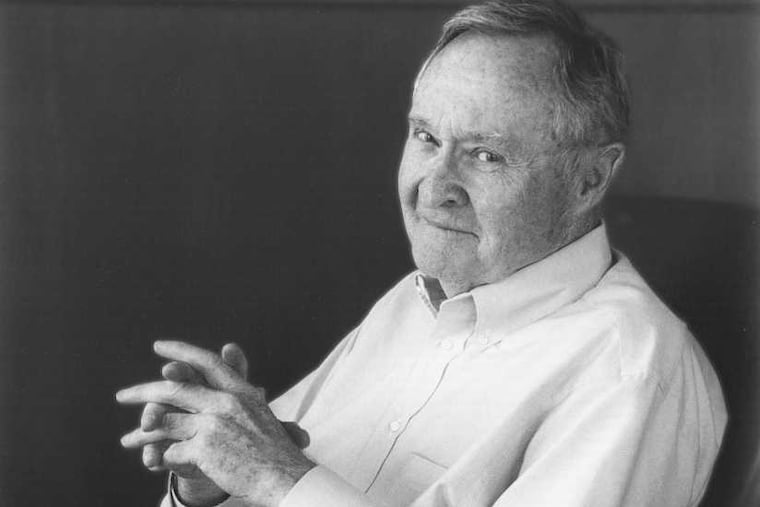John Rogers Carroll, 89, legal giant in Philadelphia who blazed trail by helping addicted lawyers
"There is not a sober lawyer in Pennsylvania that wouldn't be sober today if it wasn't for John Rogers Carroll," said Mark B. Sheppard. "And he was so humble about it."

John Rogers Carroll, 89, of Center City, a compassionate yet forceful giant in Philadelphia's legal community whose trailblazing efforts in support of lawyers struggling with addiction saved many lives and careers, died Tuesday, Jan. 2, of heart failure at his home.
From the 1950s until his retirement in 2010, Mr. Carroll was regarded as one of the city's preeminent white-collar criminal defense lawyers. He practiced from his office in Center City. He was brilliant and fearless, his colleagues said.
What made him great, said Peter F. Vaira, former U.S. attorney for the Eastern District of Pennsylvania, was his willingness to take on cases considered unpopular, especially during the "Red Scare" of the 1950s, when some citizens were blacklisted for membership in or association with the Communist Party and others were charged under the Smith Act with advocating the violent overthrow of the government.
"He was a very scholarly guy who prepared and knew the law," said Vaira. "And he was not afraid to take an unpopular cause, such as Communist Party members who were charged under the Smith Act. In the 1950s, when there was a crazy Red Scare across the U.S., people were terrified, and many lawyers would not go anywhere near those charged. But John Rogers Carroll plunged right in."
"John embodied what is best in all of us: great skill, legal acumen, and dedication to his clients and craft," said Mark B. Sheppard, a partner in Montgomery McCracken Walker & Rhoads LLP who knew Mr. Carroll well. "He was the recognized dean of the white-collar bar in Philadelphia and just about the smartest lawyer you could ever meet."
Mr. Carroll stood out as an innovator and assisted fellow lawyers who were struggling with alcoholism and drug addiction. A recovering alcoholic himself, he became the force behind Pennsylvania lawyers' recovery programs, and counseled those struggling with addiction at all hours.
"He would take personal calls," Vaira said. "One day, when I was the U.S. attorney, one of my troops did something goofy" related to drinking. "When he heard about it, he said, 'Why didn't you call me?'"
What started out as a help line grew into the Philadelphia Bar Association's Lawyers' and Judges' Assistance Committee, and then into a nonprofit called Lawyers Concerned for Lawyers (LCL). Under Mr. Carroll's guidance, LCL became a model for lawyers' assistance programs throughout the nation, such as the leading American Bar Association's Commission on Lawyer Assistance Programs.
Mary F. Platt, chancellor of the Philadelphia Bar Association, said she viewed Mr. Carroll as a pioneer on behalf of addicted lawyers. "He had a strong commitment to giving back and serving others," she said. "His lifelong dedication to helping addicted lawyers is an outstanding hallmark of his career for which he will always be remembered."
In 2002, taking the support process one step further, Mr. Carroll established the M. Patricia Carroll Fund in memory of his wife, whom he married in 1980. She died in 2000.
The nonprofit provides funds for the treatment of addicted lawyers, judges, and law students.
"There is not a sober lawyer in Pennsylvania that wouldn't be sober today if it wasn't for John Rogers Carroll," said Sheppard. "And he was so humble about it."
Born in Philadelphia, Mr. Carroll graduated from St. Joseph's Preparatory School, and earned a bachelor's degree from St. Joseph's University in 1949 and a law degree from the University of Pennsylvania Law School in 1952.
In 1953, while in private practice, Mr. Carroll was chosen to be part of an elite team of volunteer lawyers representing nine local members of the Communist Party who were accused of advocating to overthrow the government. The defendants had been unable to obtain paid defense counsel.
After a five-month federal trial, the nine were convicted, but the convictions were overturned on appeal.
During the mid- and late 1950s, Mr. Carroll represented Philadelphia public school teachers who were fired after exercising their Fifth Amendment right to silence when questioned by school officials or congressional committees about being affiliated with the Communist Party.
He also volunteered his services as vice chairman of the Philadelphia Commission on Human Relations, served as director of the Eagleville Foundation and Eagleville Hospital, which treats addicts, and was a member of the Pennsylvania Advisory Council on Drug and Alcohol Abuse.
Mr. Carroll received the Philadelphia Bar Association Fidelity Award, Pennsylvania Bar Association Special Achievement Award for service to Lawyers Concerned for Lawyers, St. Thomas More Society Award for service to the Bar, Philadelphia Psychiatric Society Benjamin Rush Award, and American Inns of Court Professionalism Award.
Despite the accolades, Mr. Carroll always shunned the limelight. He refused to discuss his cases with the media.
In addition to practicing law, Mr. Carroll enjoyed traveling with his wife, going to museums, and attending performances of the Philadelphia Orchestra and the Philadelphia Opera Company.
"He was a loving friend with a magnificent mind and great sensibility," his family said.
Mr. Carroll is survived by a brother, Joseph "Skip" Carroll.
Funeral services and burial will be private.
Memorial donations may be made to the M. Patricia Carroll Fund, Box 1233, Media, Pa. 19063.